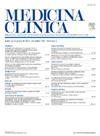Consumo de cigarrillos, polimorfismos genéticos y mielodisplasia: un estudio de casos y controles
IF 2.1
4区 医学
Q1 MEDICINE, GENERAL & INTERNAL
引用次数: 0
Abstract
Background
Both cigarette smoking (CGS), through its role as a benzene source, and some metabolic detoxyfiying enzymes (EDTOX) polymorphisms that hamper its inactivation, are considered as risk factors for the development of myelodysplastic neoplasms (MDS) and related disorders. This study aims to confirm such associations.
Patients and Methods
We recruited 61 patients diagnosed with MDS following FAB Group criteria and 180 adults without peripheral blood cytopenia, and we analyzed: i) the crude odds-ratio (OR) for MDS between smokers and non-smokers, ii) the crude OR for MDS between homozygous individuals for the mutation NQO1609C—T, or harboring deletions in the genes codyfing for GSTM1 y GSTT1, and those who did not show such genotypes, and iii) the OR for MDS between smokers and non-smokers, adjusted for other potential risk factors.
Results
Our data confirm the association between MDS with a 28 pack-year or greater CGS history (OR 3.10; IC 95% 1.38-6.96). Conversely, we did not observe any association between MDS diagnosis and the EDTOX genotypes analyzed.
Conclusions
Cigarette smoking history is more relevant than EDTOX genotype in MDS etiopathogenesis.
吸烟、基因多态性和骨髓发育不良之间的关系:一项多中心病例对照研究。
背景:吸烟(CGS)作为苯源的作用,以及一些代谢解毒酶(EDTOX)多态性阻碍其失活,被认为是骨髓增生异常肿瘤(MDS)和相关疾病发展的危险因素。本研究旨在证实这种关联。患者和方法:我们招募了61名符合FAB组标准诊断为MDS的患者和180名无外周血细胞减少症的成年人,我们分析:i)吸烟者和非吸烟者之间MDS的粗比值(OR), ii)突变NQO1609C-T或编码GSTM1或GSTT1基因缺失的纯合个体与未显示此类基因型的个体之间MDS的粗比值(OR),以及iii)吸烟者和非吸烟者之间MDS的OR(经其他潜在危险因素调整后)。结果:我们的数据证实MDS与28包年或以上的CGS病史(or 3.10;IC 95% 1.38-6.96)。相反,我们没有观察到MDS诊断与分析的EDTOX基因型之间的任何关联。结论:吸烟史与EDTOX基因型在MDS发病中的相关性更大。
本文章由计算机程序翻译,如有差异,请以英文原文为准。
求助全文
约1分钟内获得全文
求助全文
来源期刊

Medicina Clinica
医学-医学:内科
CiteScore
3.10
自引率
5.10%
发文量
295
审稿时长
22 days
期刊介绍:
Medicina Clínica, fundada en 1943, es una publicación quincenal dedicada a la promoción de la investigación y de la práctica clínica entre los especialistas de la medicina interna, así como otras especialidades. Son características fundamentales de esta publicación el rigor científico y metodológico de sus artículos, la actualidad de los temas y, sobre todo, su sentido práctico, buscando siempre que la información sea de la mayor utilidad en la práctica clínica.
 求助内容:
求助内容: 应助结果提醒方式:
应助结果提醒方式:


